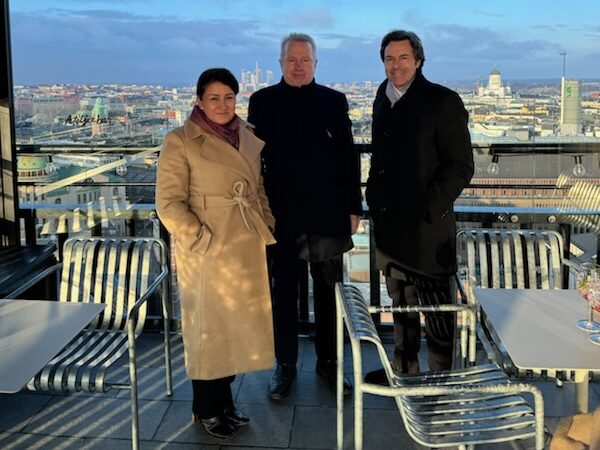
The Spring Seminar ended at 16:30
Warm thank you to everyone who participated in the SESKO Spring Seminar! The excellent content from the speakers and the active participation in discussions by the audience created a unique opportunity to share knowledge, ideas, and perspectives. Your contribution made this event truly meaningful and inspiring. We hope to see you again in 2025.
At 16:15 Awarded R&D Projects 2023
At the end of 2023, SESKO conducted an R&D competition aimed at vocational colleges and universities in the electrical field.
Educational institutions were invited to submit current research projects and final theses that address the electrifying society, clean energy, cybersecurity, and automation based on artificial intelligence, utilizing electrotechnical standards in accordance with the participation conditions. SESKO’s board granted a two thousand euro (€2000) award to three research projects. The awards were presented at the Spring Seminar.
Jyväskylä University of Applied Sciences (JAMK) was awarded for its innovative “KOESTUS” project, which focuses on the research and development environment for electrical grid protections. The project provides a platform for testing and developing new protection technologies, enhancing the safety and reliability of the electrical grid.
Tampere University of Applied Sciences (TAMK), in collaboration with Tallinn University of Applied Sciences and Brno University of Technology, was awarded for the “Elmicro” project. “Elmicro” is a micro-degree program focusing on harmonized education in modern electrical engineering, offering students up-to-date skills in an ever-evolving field.
South-Eastern Finland University of Applied Sciences (XAMK) was awarded for its “FarmEnergy” project, which focuses on developing energy communities for farms. The project aims to promote the use of renewable energy and energy efficiency on farms, supporting sustainable development goals and enhancing the energy self-sufficiency of the agricultural sector.
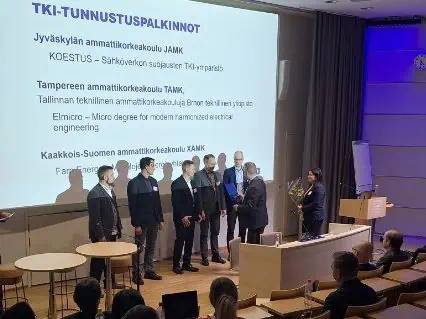
At 16:10 SESKO Recognition Awards 2024
In 2000, SESKO’s board approved a recognition award system modeled after the IEC Lord Kelvin Award. According to this system, individuals who have made significant contributions to the field of electrical standardization could be awarded the Erkki Yrjölä Medal, which has been awarded to 37 individuals to date. The recognition award was revamped in 2015 to celebrate SESKO’s 50th anniversary, and it was renamed the SESKO Recognition Award. Since then, recognition awards have been granted in 2015, 2017, 2020, 2022, and 2023, totaling 13 awards.
At this year’s Spring Seminar, the 2024 SESKO Recognition Award 14 was presented to Kai Niskala of Emfex Oy, and award 15 was given to Kari Ahlskog of ABB Oy.
At 15:50 Student Panel – Thoughts, Questions, and Opinions Based on All Lecturers’ Presentations.
Students from the Tampere University of Applied Sciences (TAMK), Linda Vallenius and Anton Helanne, and from the University of Vaasa, Divari Alam Suvra and Abdullah Al Noman Chowdhury, created a lively discussion in the SESKO Spring Seminar panel. They deeply pondered the presentations of the seminar lecturers, bringing out diverse views, critical questions, and new ideas. The discussion particularly highlighted the panel’s interdisciplinary approach and the ability to link theory to practice, reflecting their academic backgrounds. The dialogue between the panelists offered valuable insights and new perspectives on the seminar themes, demonstrating the important role of young experts in solving future challenges.
At 15:20 Annukka Saari’s Speech “Hydrogen as Part of the Technology Industry’s Low-Carbon Roadmaps Implementation”
Annukka Saari, the leading expert on climate and energy policy at the Technology Industries of Finland, discussed how Finland adopts a unique approach to achieving carbon neutrality by 2035, focusing on 14 business sector-specific climate roadmaps that are integrated and interlinked. The climate and energy strategy, initiated by the Ministry of Employment and the Economy in 2020 and updated in 2023, highlights the strong commitment of Finnish companies to be part of the solution to climate change challenges. Future plans include, among others, updates to the Technology Industry’s low-carbon roadmaps for 2024, the potential of carbon capture and utilization at the national level, and hydrogen park projects.
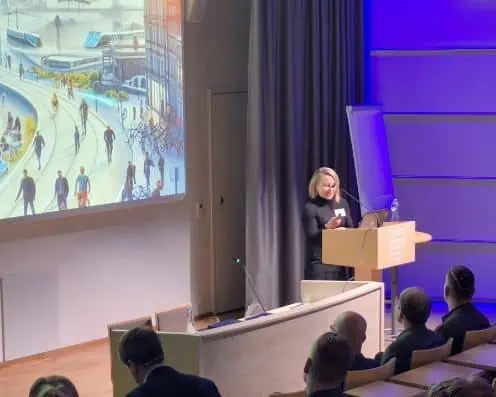
At 14:30 Hannu Toivonen’s Presentation on Artificial Intelligence.
At the Spring Seminar, Professor Hannu Toivonen, a long-standing AI researcher from the University of Helsinki, shed light on the current state and future prospects of artificial intelligence. Toivonen, who has been working with AI since 1990, discussed the rationality of AI and the fundamentals of generative AI in his presentation. The presentation also covered AI trends, language translations, and the impact of automation on the future workforce. Toivonen’s speech provided a comprehensive overview of AI’s potential and challenges, sparking interest and discussion among the audience.
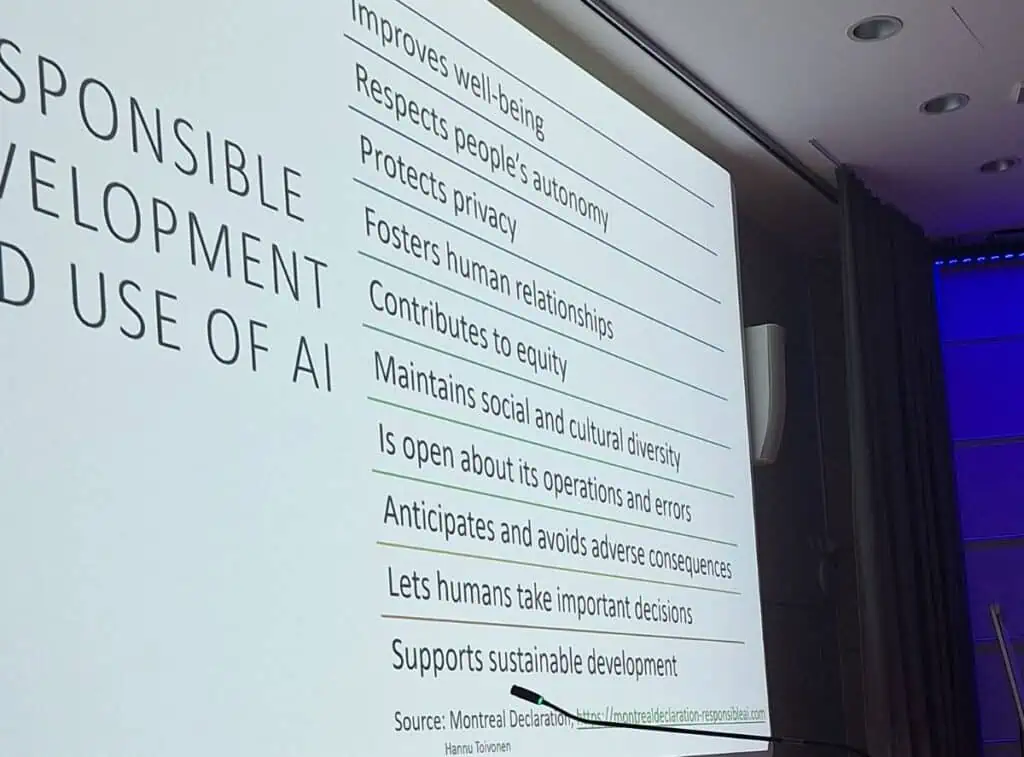
At 14:10 Talotekniikka -lehti (Building Services Engineering magazine) interviewed Philippe Metzger
The interview focused on the significance and role of the International Electrotechnical Commission (IEC) standards in the field of building services, especially in the standardization of heating, ventilation, and air conditioning (HVAC) systems, as well as electrical systems in buildings. Standards are crucial for the development and innovation of the building services industry, as they define common technical requirements and methods that ensure the compatibility, safety, and efficiency of devices and systems.
The article will be published in the Building Services Engineering 5/24 magazine on June 20, 2024.
At 13:50 Student Panel – Young Perspectives on Hydrogen and Energy Solutions, and the Use of Electrotechnical Standardization in Promoting the Green Transition.
The “Youth Transition” student panel at the Spring Seminar brought fresh winds and young perspectives to the discussion on hydrogen, energy solutions, and the role of electrotechnical standardization in promoting the green transition. Linda Vallenius and Anton Helanne from the Tampere University of Applied Sciences (TAMK), and Divari Alam Suvra and Abdullah Al Noman Chowdhury from the University of Vaasa, discussed how the use of clean energy and innovative technologies could shape future energy systems and promote sustainable development. The panel offered a unique opportunity to hear young voices and their visionary thoughts on how technology and standards can together create a more sustainable world.
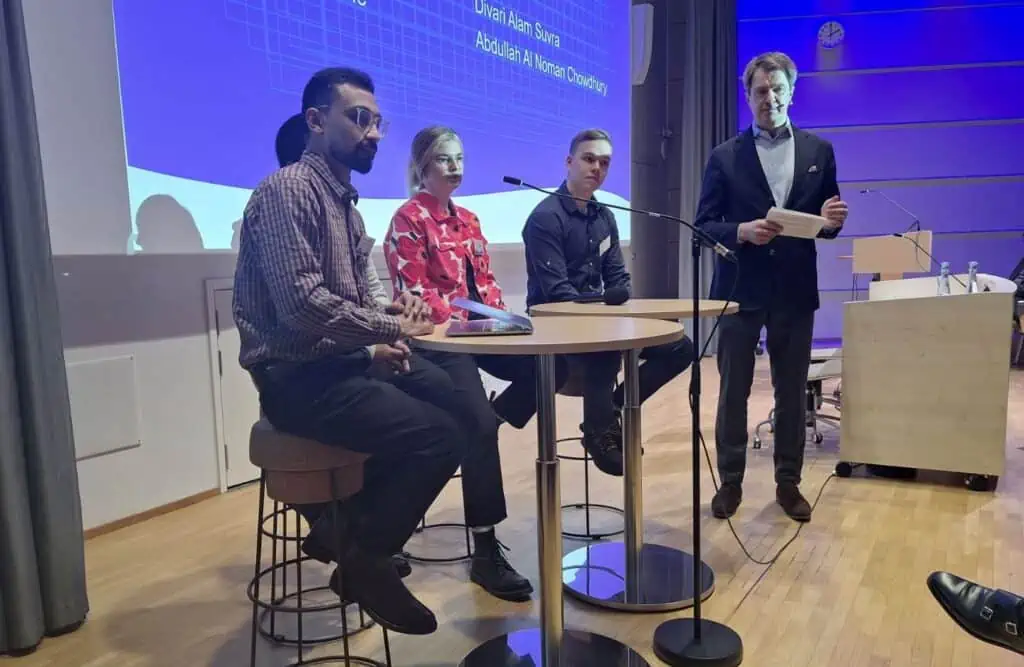
At 13:10 Olli-Pekka Aalto’s presentation “Green Hydrogen”
Olli-Pekka Aalto, Head of Global Energy & Power of Danfoss Drives, enlightened the audience about the company’s latest advancements in hydrogen production and the utilization of smart electrical technologies. Aalto’s presentation emphasized how Danfoss Drives has embraced advanced electrical technologies to optimize the hydrogen production process, not only reducing energy consumption but also making hydrogen production more sustainable and cost-effective.
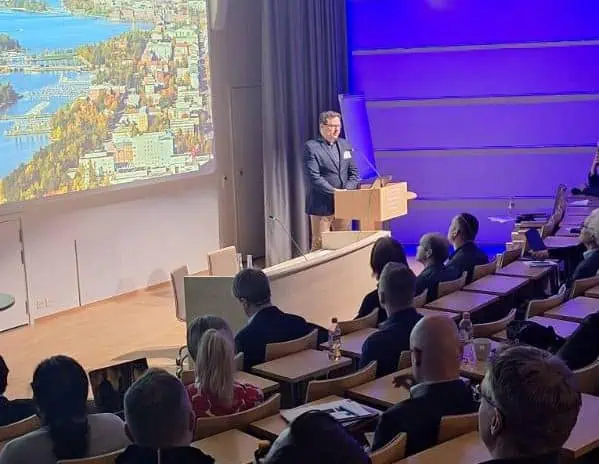
At 12:15 Philippe Metzger’s speech “The IEC, AI, and the green transition”
IEC Secretary-General and CEO, Philippe Metzger, emphasized the importance of artificial intelligence and the green transition in addressing today’s challenges in his speech. The work of over 20,000 experts in IEC standards and conformity assessments helps shape future technologies and promote sustainable development, including Finnish expert groups.
The speech highlighted Finland’s rich history in electrical standardization since the turn of the century, combined with the active participation of over 500 Finnish experts in international projects, as a valuable contribution to global sustainable development.
The speaker emphasized IEC’s role in developing reliable and safe technologies that support a connected society where fossil fuels are no longer used for electricity production or transportation. Philippe also mentioned the significance of IEC’s work in standardizing new technologies, such as artificial intelligence, and its application in combating climate change.
IEC’s SMART standards and conformity assessment were presented as examples of how the organization aims to meet the challenges of changing economic and social needs. The importance of gender-neutral standards and diversity in standard development work was also highlighted.
In conclusion, Philippe invited the audience to discuss and contribute to the development of future standards, emphasizing the importance of collaboration and openness in promoting global sustainable development.
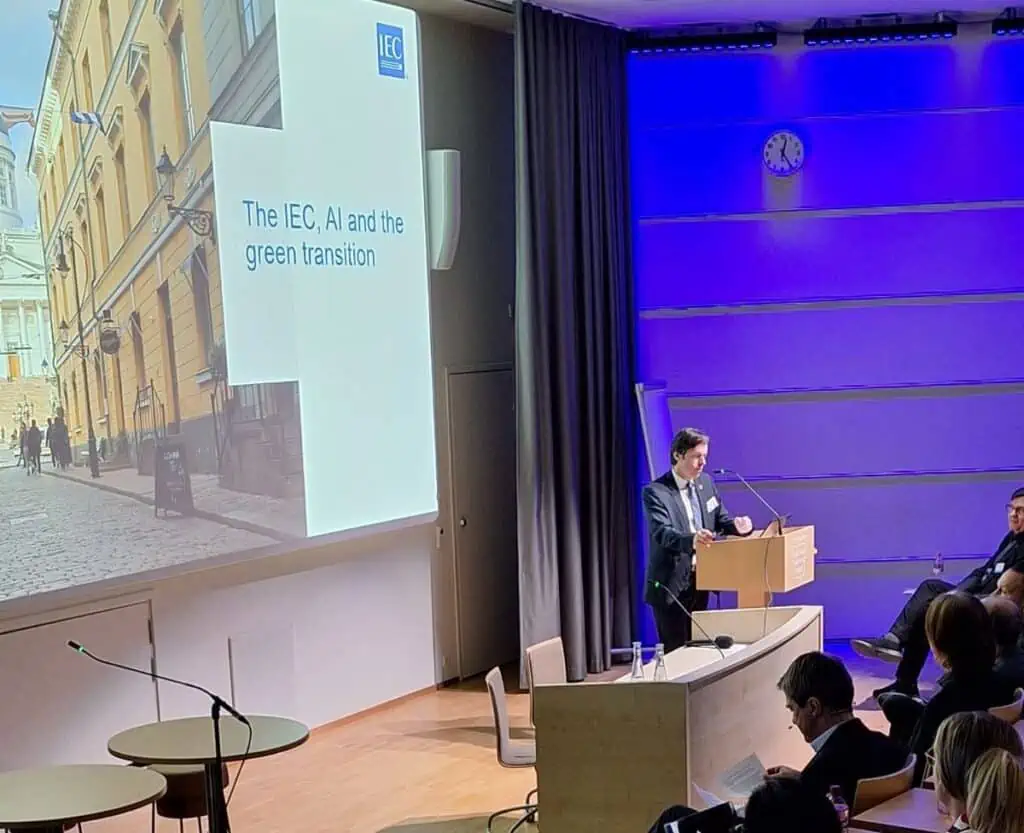
At 12:00 Opening of the Spring Seminar
The SESKO Spring Seminar 2024 started with opening speeches by CEO Anna Tanskanen and Chairman of the Board Esa Tiainen, highlighting the importance of collaboration and innovation in the electrical field.
Anna Tanskanen’s speech emphasized the key role of standardization in the safe development of an electrifying society and the potential of hydrogen as a clean energy source. She challenged the participants to think about new ways to utilize standards and standardization networks, reflecting SESKO’s desire to promote the field through collaboration and innovation.
Esa Tiainen’s speech emphasized SESKO’s role in promoting sustainable development and the importance of standardization in electrical safety and international competitiveness. He also mentioned SESKO’s efforts to respond to the future challenges of the electrical field, such as digitalization, artificial intelligence, and cybersecurity, reflecting the organization’s strategic direction towards a sustainable future.
The core messages of both speeches were closely related to the electrification of society, maintaining, and developing safety, and the integration of new technologies such as clean hydrogen and artificial intelligence through standardization. SESKO is committed to promoting sustainable development and innovation in the electrical field through standardization, supporting Finnish companies’ international competitiveness and promoting the safe development of an electrifying society.
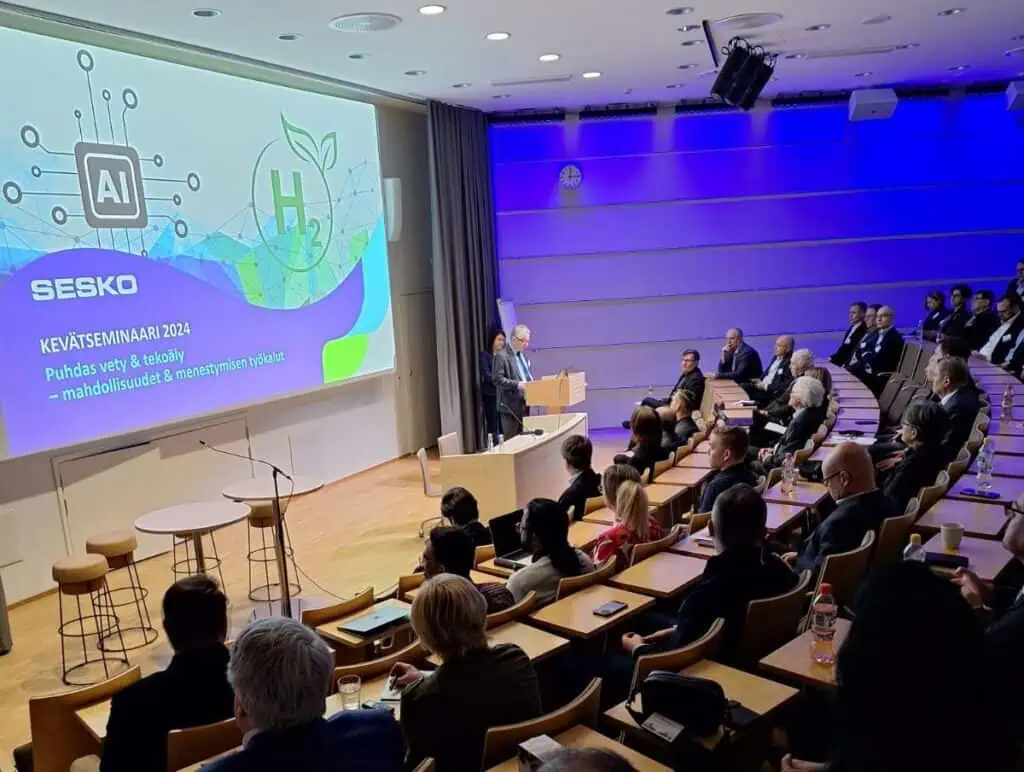
At 09:20 Philippe Metzger visits SGS Fimko
Philippe Metzger visited SGS Fimko’s State of the Art testing laboratory and met with IEC CAB member Markus Ahvenus (on the right) and Mika Richardt. At the meeting, SGS Fimko emphasized that they want to be actively involved in standardization committees and influence the definition of standard testing methods through their professional expertise in connection with the preparation of standards.
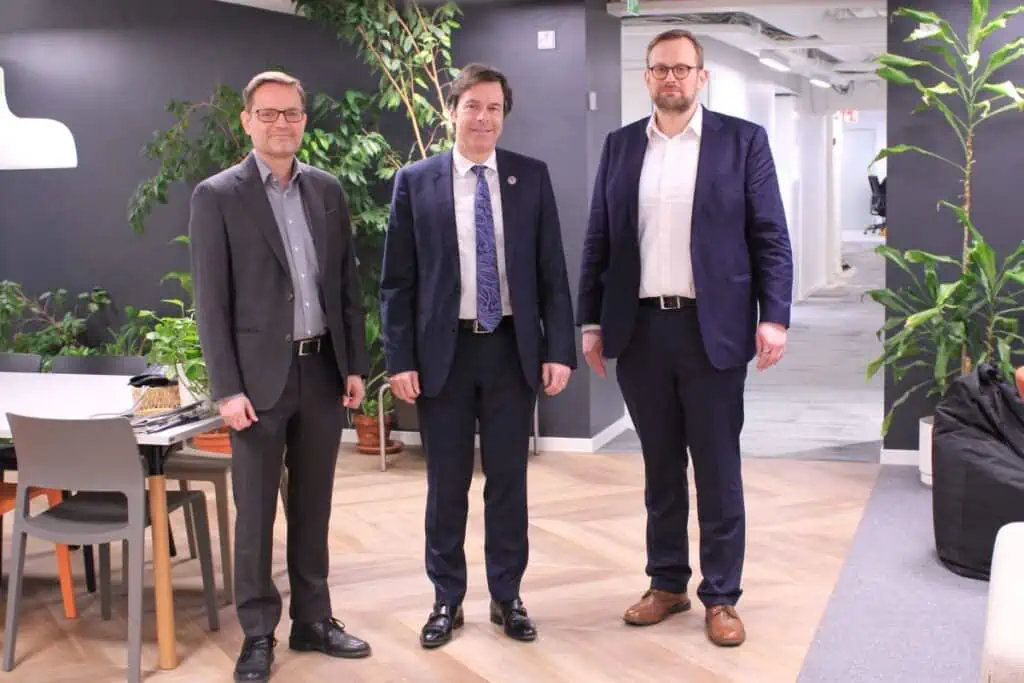
At 09:05, Philippe Metzger made a video presentation to students.
In his speech, he emphasized the importance of IEC’s work in integrating global challenges such as climate change, sustainability, and disruptive technologies like artificial intelligence. IEC, a leading global player in the standardization of electricity, electronics, and IT, plays a crucial role in developing standards that facilitate the adoption of new technologies, ensuring their safe implementation, and maintaining human values and non-discriminatory practices.
The organization’s contribution is particularly significant in advancing artificial intelligence across various sectors. IEC also supports UN Sustainable Development Goal 7, aiming for accessible, sustainable, and modern energy for all, focusing on renewable sources like hydro, wind, and solar power.
IEC is also investing in the future through its Young Professionals program, encouraging the next generation to participate in standardization work. Metzger encourages participation in IEC activities through national committees like Finland’s SESKO to help shape a sustainable, fully electric, and interconnected society.
At 9:00 – The seminar day starts at Takomotie office
SESKO’s CEO, Anna Tanskanen, welcomed IEC Managing Director Philippe Metzger at SESKO’s premises on Takomotie in the morning. We are very pleased with Mr. Metzger’s participation in our most important annual event, the Spring Seminar, and look forward to his speech on “The IEC, AI, and the green transition.”
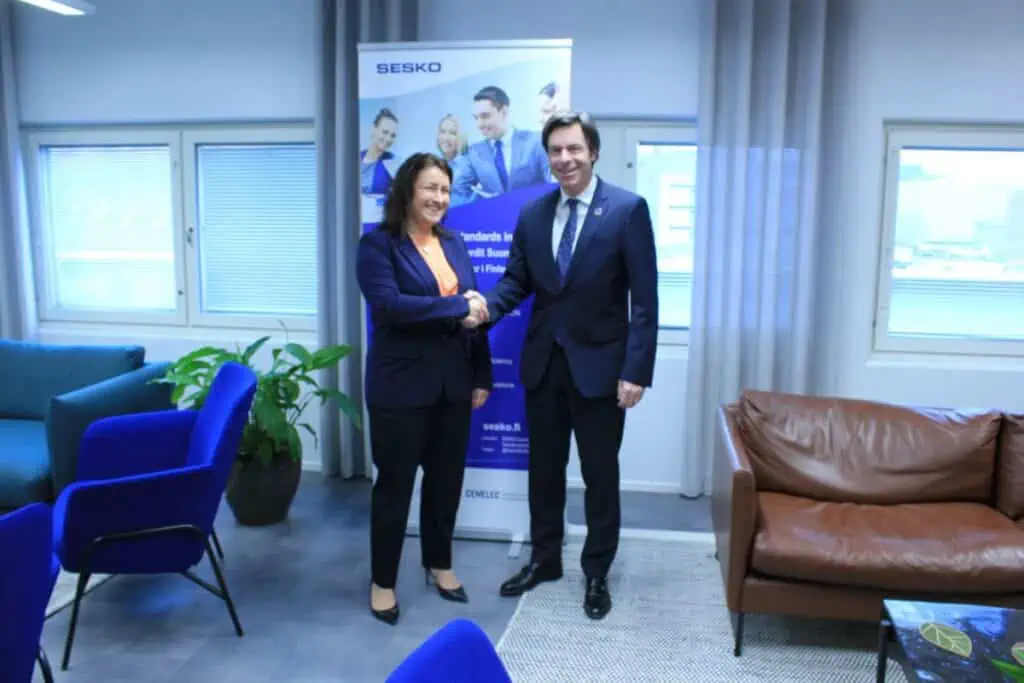
26.3.2024 at 18:00 – The Spring Seminar 2024 Kick-off Dinner
National standardization influencers met at a dinner organized by SESKO on March 26, with IEC’s CEO Philippe Metzger as their guest.
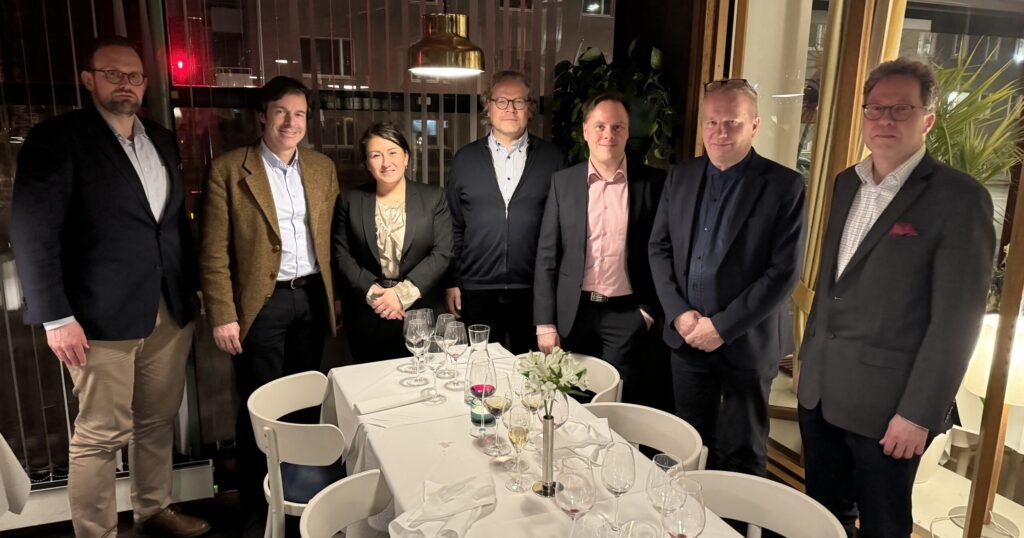
The meeting of national standardization influencers, held on the evening before SESKO’s Spring Seminar, provided an excellent opportunity for discussions on the central role of standardization in enhancing the competitiveness of industry. Finland’s conditions are favorable for investments focusing on renewable and fossil-free energy forms, energy storage, and new, innovative energy solutions, such as hydrogen. In addition, modern technologies, such as quantum computing, robotics, and artificial intelligence, offer effective means to advance business, improve corporate competitiveness, and solve labor shortages.
Add to favorites